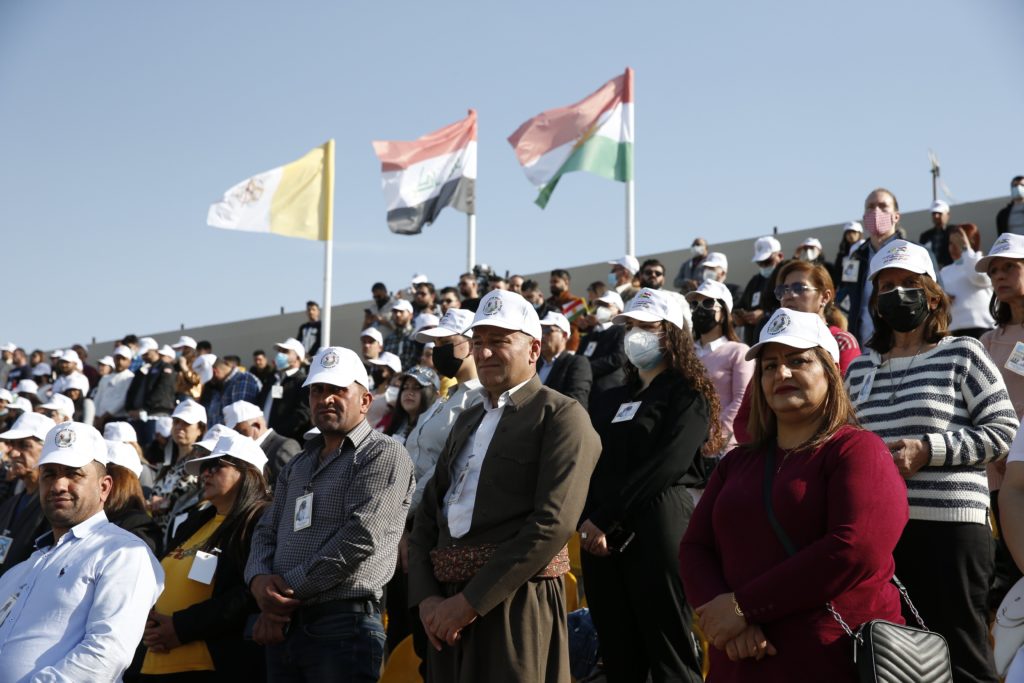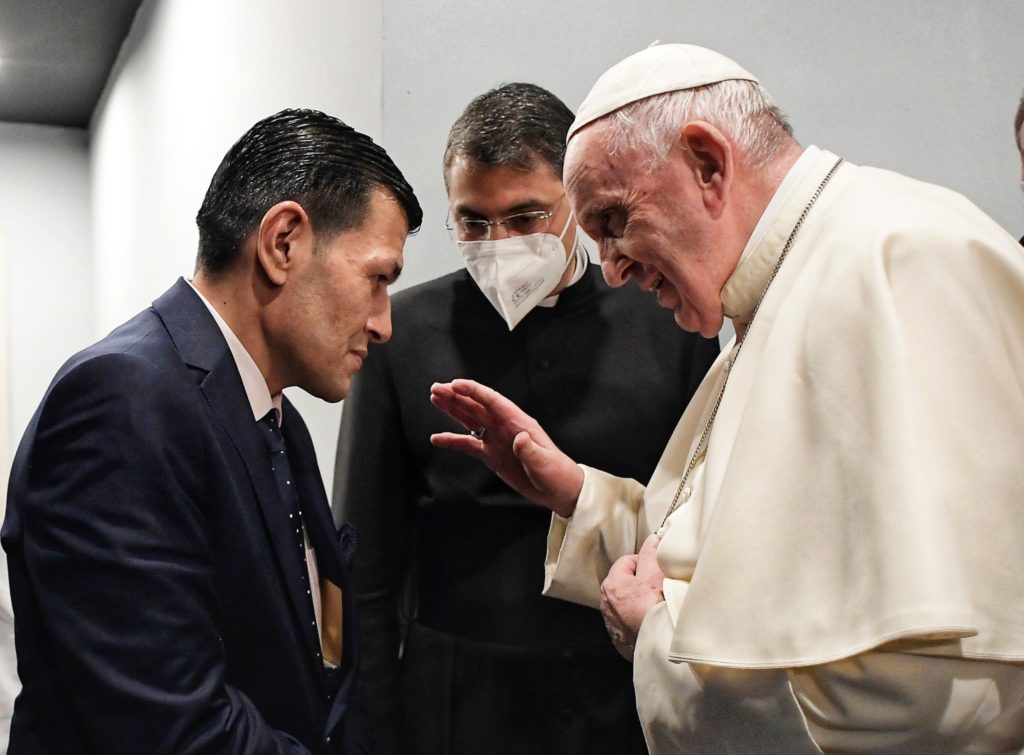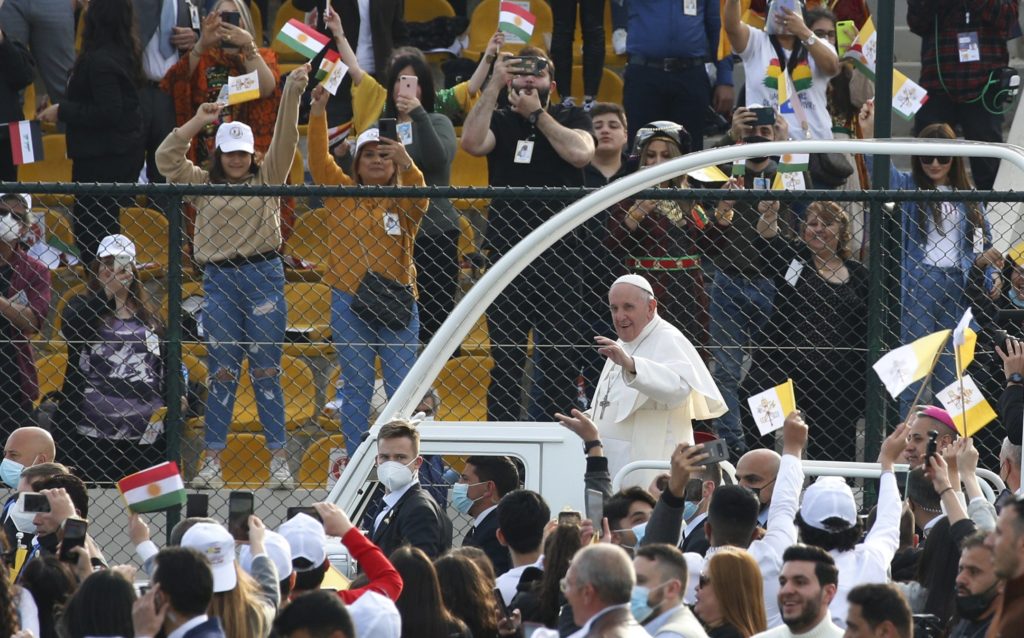The Pope's historic trip was coming to an end, but he would still have one last act, much awaited by the Catholic community: the Holy Mass at the Franso Hariri stadium in Erbil.
After lunch at the Patriarchal Seminary of St. Peter, the Holy Father went directly by car to the Franso Hariri Stadium in Erbil for the celebration of the Eucharist.
At the Franso Hariri Stadium
The stadium was packed with the faithful, who were waiting for a close-up view of the Holy Father. They tried to keep a safe distance, without crowds. The Pope was able to take a few rides in the popemobile among the faithful, to greet them and see their faces. At 4:30 p.m. local time (2:30 p.m. Rome time) the Pope began presiding the Eucharistic celebration in the presence of about 10,000 faithful.
In his homily, Francis began by alluding to the importance of the centrality of Christ and the Cross in our lives, noting that "St. Paul reminded us that 'Christ is the power of God and the wisdom of God' (1 Cor 1:24). Jesus revealed this power and wisdom above all in mercy and forgiveness. He did not want to do so with demonstrations of strength or by imposing his voice from on high, nor with long discourses or displays of incomparable knowledge. He did it by giving his life on the cross. He revealed divine wisdom and power by showing us, to the very end, the faithfulness of the Father's love; the faithfulness of the God of the Covenant, who brought his people out of slavery and led them on the way of freedom (cf. Ex 20:1-2).
In the face of temptation
The Pope recalled that in the face of the temptation to take revenge in the face of insults and attacks, Jesus shows us that another response is possible, the way of God: "How easy it is to fall into the trap of thinking that we must prove to others that we are strong, that we are wise... In the trap of fabricating false images of God to give us security... (cf. Ex 20:4-5). In reality, it is the opposite, we all need the strength and wisdom of God revealed by Jesus on the cross. On Calvary, He offered to the Father the wounds by which we have been healed (cf. 1 Pet 2:24). Here in Iraq, how many of your brothers and sisters, friends and fellow citizens bear the wounds of war and violence, visible and invisible wounds. The temptation is to respond to these and other painful events with human strength, with human wisdom. Instead, Jesus shows us God's way, the way he has walked and calls us to follow him".

"In the Gospel we have just heard (Jn 2:13-25), we see that Jesus drove out of the Temple of Jerusalem the money changers and all those who bought and sold. Why did Jesus make such a strong and provocative gesture? He did it because the Father commanded him to purify the temple, not only the temple of stone, but above all the temple of our heart. Just as Jesus did not tolerate that his Father's house should become a marketplace (cf. Jn 2:16), so he desires that our heart should not be a place of agitation, disorder and confusion".
Purifying the heart
"The heart is cleansed, ordered, purified. From what? From the falsehoods that defile it, from the duplicity of hypocrisy; we all have them. They are diseases that hurt the heart, that cloud life, that make it double. We need to be cleansed of our false securities, which bargain faith in God with things that happen, with the conveniences of the moment. We need to eliminate from our heart and from the Church the harmful suggestions of power and money. To cleanse the heart we need to get our hands dirty, to feel responsible and not stand idly by while our brothers and sisters suffer. But how can we purify our hearts? We cannot do it alone, we need Jesus. He has the power to overcome our ills, to cure our illnesses, to restore the temple of our heart".
"To confirm this," the Pope continues, "as a sign of his authority he says: 'Destroy this Temple and in three days I will raise it up again' (v. 19). Jesus Christ, He alone can purify us from the works of evil, He who died and rose again, He who is the Lord. Dear brothers and sisters: God does not let us die in our sin. Even when we turn our backs on him, he does not abandon us to our own fate. He seeks us out, he follows us, to call us to repentance and to purify us. "I swear by my life - oracle of the Lord God - that I have no pleasure in the death of the wicked, but that he may turn from his wicked ways and live" (33:11). The Lord wants us to be saved and to be living temples of his love, in fraternity, service and mercy".
Witnessing to the Gospel
The Pope wanted to remind us that Jesus sends us to bear faithful witness to the Gospel, and that with the power of the Holy Spirit, he has the power to change lives: "Jesus not only purifies us of our sins, but makes us sharers in his own power and wisdom. He frees us from a way of understanding the faith, the family, the community that divides, that opposes, that excludes, so that we can build a Church and a society open to all and solicitous towards our brothers and sisters most in need. And at the same time he strengthens us, so that we may know how to resist the temptation to seek revenge, which plunges us into an endless spiral of retaliation. With the power of the Holy Spirit, he sends us, not to proselytize, but as his missionary disciples, men and women called to witness that the Gospel has the power to change lives.
The Lord promises us that he can bring us and our communities back from the wreckage of injustice, division and hatred.
"The Risen One makes us instruments of God's peace and mercy, patient and courageous artisans of a new social order. Thus, through the power of Christ and his Spirit, what the Apostle Paul prophesied to the Corinthians comes to pass: "What seems foolishness in God is wiser than all that is human, and what seems weakness in God is stronger than all that is human" (1 Cor 1:25). Christian communities made up of humble and simple people become a sign of the Kingdom that is coming, the Kingdom of love, justice and peace.
Anointing wounds
The words of Christ, "Destroy this Temple and in three days I will raise it up again" (Jn 2:19), came from the circumstances, which Francis took advantage of to assure that Christ "was speaking of the temple of his body and, therefore, also of his Church. And that "the Lord promises us that, with the power of his Resurrection, he can make us and our communities rise again from the destruction caused by injustice, division and hatred. This is the promise we celebrate in this Eucharist. With the eyes of faith, we recognize the presence of the crucified and risen Lord in our midst, we learn to welcome his liberating wisdom, to rest in his wounds and to find healing and strength to serve his coming Kingdom in our world. By his wounds we have been healed (cf. 1 Pet 2:24); in his wounds, dear brothers and sisters, we find the balm of his merciful love; for he, the Good Samaritan of humanity, wishes to anoint every wound, heal every painful memory and inspire a future of peace and brotherhood on this earth."
In closing his homily, the Holy Father assured that "the Church in Iraq, with God's grace, has done and is doing much to proclaim this wonderful wisdom of the cross by spreading Christ's mercy and forgiveness, especially to those most in need. Also in the midst of great poverty and hardship, many of you have generously offered concrete help and solidarity to the poor and suffering. This is one of the reasons that prompted me to come as a pilgrim among you, to thank you and to confirm you in your faith and witness. Today, I can see and feel that the Church of Iraq is alive, that Christ lives and acts in this holy and faithful people of His.
With the little castaway
At the end of the Mass, the Chaldean Archbishop of Erbil, H.E. Msgr. Bashar Matti Warda, C.S.S.R., addressed a speech of greeting and thanksgiving to the Holy Father. Before the final blessing, Pope Francis addressed words of greeting to the faithful and pilgrims present and then met with Mr. Abdullah Kurdi, father of little Alan, who was shipwrecked with his brother and mother off the Turkish coast in September 2015 while trying to reach Europe. The Pope spoke with him at length and, with the help of the interpreter, was able to listen to the father's grief over the loss of his family and express his and the Lord's deep involvement in the man's suffering. Mr. Abdullah expressed his gratitude to the Pope for his words of closeness to his tragedy and to that of all migrants who seek understanding, peace and safety by leaving their country at the risk of their lives.

After bidding farewell to the Archbishop of Erbil, the President and the Prime Minister of the autonomous region of Iraqi Kurdistan, the Holy Father left the "Franso Hariri" stadium and drove to Erbil airport to board an Iraqi Airways plane bound for Baghdad airport. He then returned by car to the Apostolic Nunciature.







